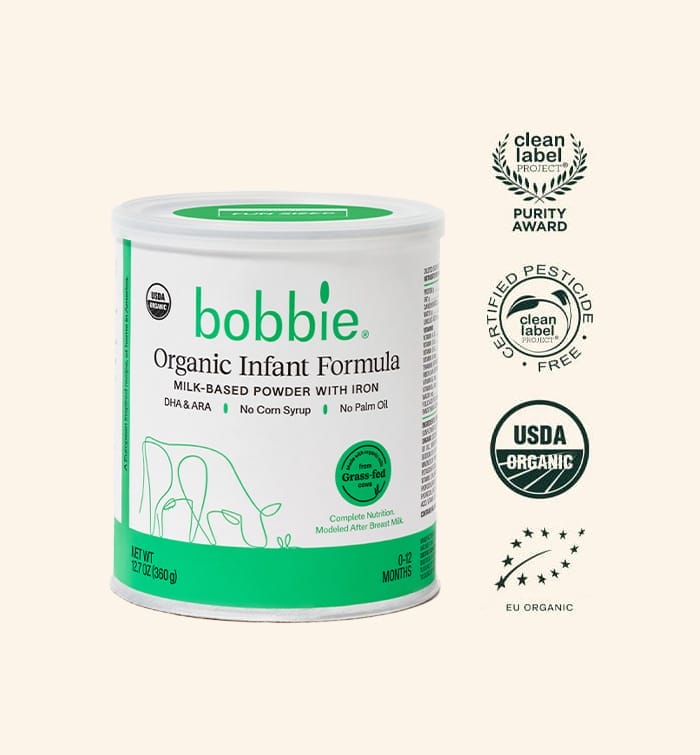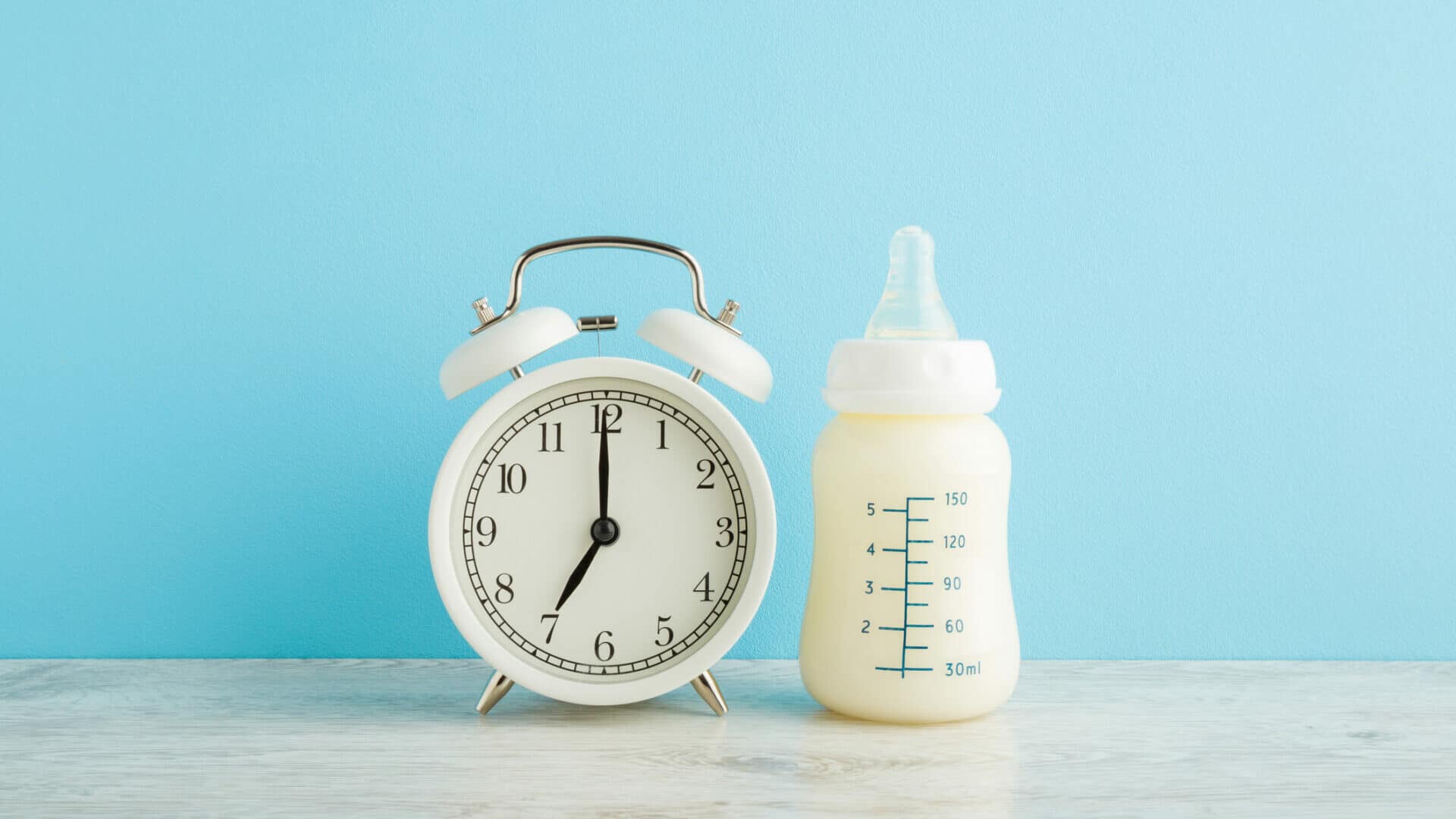We are proud to say that these posts are not sponsored. Our editorial team of Bobbie moms and writers personally select each featured product. If you buy something through our links, we may earn an affiliate commission, at no cost to you.
When you’re formula feeding your baby, it may seem like you’re making formula all the time. Babies eat often, and their tiny stomachs can only hold so much at once. When your little one constantly wants another bottle, it can be tempting to make your baby formula in batches and have a few days’ worth ready to go.
However, you’ve likely also heard that unused prepared formula should be thrown out after 1 hour. There are a lot of safety rules when it comes to making formula. So how long is formula good for?
- After preparation, how long can baby formula sit out at room temperature?
- How long does prepared formula last in the fridge?
- How long does unopened baby formula last?
- How long does baby formula last once the container is open?
- What to do with Expired Formula?
- Tips for Safely Preparing Infant Formula
- What you should know about formula safety
After preparation, how long can baby formula sit out at room temperature?
If you’re switching from breastfeeding to infant formula, it’s important to know that storage recommendations will be different. So how long can formula sit out? Here are the basics:
When in doubt, toss unused formula after 1 hour at room temp
There are different recommendations for how long prepared formula (that your baby hasn’t drank from) can be left out at room temperature before it should be discarded.
The American Academy of Pediatrics (AAP) says that formula out for longer than 1 hour at room temperature should be thrown away. They also state that formula that has been out for 1 hour or less can be safely stored in the refrigerator.3
The Centers for Disease Control and Prevention (CDC) says that formula does not need to be thrown away until it’s been out at room temperature for more than 2 hours. According to them, if it’s been out for less than 2 hours at room temperature, it can safely be moved to the refrigerator for storage.2
Be sure to check the instructions on your specific formula container and when in doubt, be cautious and stick to the 1 hour rule.
If your baby drank from the bottle, throw away leftover formula
After you prepare formula, any leftovers in the bottle your baby drank from needs to be thrown away. This is because baby’s bottle now contains bacteria from your baby’s mouth, which means it might be contaminated with germs that are likely to multiply.2
How long does prepared formula last in the fridge?
That depends on the type of formula you are using.
Powdered Formula
Both the AAP and the CDC agree that formula made from powder can be safely stored in the refrigerator for up to 24 hours. After that, it should be thrown away.2,3 If the formula has been heated, it must be used within an hour of preparation and cannot be refrigerated regardless of whether your baby drank from it.5

Shop Bobbie Organic Infant Formula
Bobbie Organic Infant Formula is a USDA Organic, EU-style infant formula that meets all FDA requirements. It is a complete nutrition milk-based powder modeled after breast milk and is easy on tummies. It is non-GMO and doesn't have corn syrup, palm oil, or maltodextrin. Learn more about Bobbie.
Liquid concentrate and ready-to-feed formula
Liquid concentrate formula needs water added to make a bottle and ready-to-feed formula can be given as is.3
Room Temperature: Like powdered formula, concentrate and ready-to-feed formulas last 1 hour at room temperature and bottles should be thrown away instead of stored in the fridge if your baby drinks from them.2
Refrigerated: Bottles prepared from liquid concentrate and open containers of ready-to-feed formula can be stored in the fridge for up to 48 hours if your baby hasn’t drank from them.2
Do not refrigerate and throw out your formula if:
- Baby already drank from the bottle: If you begin bottle feeding and your baby leaves some formula behind, the leftovers must be discarded within the hour.
- You’ve heated the milk: Warm environments harbor bacteria, so it’s essential that you use prepared infant formula within one hour from when feeding begins.
- It has been more than 24 hours since preparation: It’s always best to make bottles right before you feed them to your baby.
- Formula has passed its expiration date: Check your formula container and label carefully.
How long does unopened baby formula last?
There are a few important things to know about storing infant formula to keep it fresh and safe. Follow your package directions. It should never be kept somewhere outdoors, like in a car, where the container can get too hot.
Powdered Formula
- Unopened, you can rely on the expiration date listed on your formula container. Sealed containers shouldn’t be refrigerated before use. Instead, you should keep them in a cool, dry place until you are ready to use them. Most cans are good for 30 days after they are opened, but always refer to the manufacturer for any questions.
Liquid Concentrate and Ready-to-Feed Formula
- Check the expiration date. Store in a cool, dry place until you are ready to use.
How long does baby formula last once the container is open?
It’s important to follow the instructions on your formula package. Storage varies by formula type.
Powdered Formula
- Once a powdered formula container is opened, it should be used within 1 month. It’s a good idea to keep a pen or marker near where you store your formula so you can write the date you open the container on the lid. Once a formula container is opened, make sure to store it in a cool dry place, but not in the refrigerator.
Liquid Concentrate and Ready-to-Feed Formula
- Each container should state storage instructions – but in general – once you open a liquid or ready-to-feed formula – it should be refrigerated right away and consumed within 48 hours. If you keep it at room temp, it needs to be discarded after two hours.
What to do with Expired Formula?
Mallory, The Formula Mom, recommends that in addition to abiding by the expiration date on the bottom of the container, parents should look for signs of expiration even if the printed date hasn’t passed. These include changes in formula color, texture, smell, or solubility. All powdered formula should be used within 30 days of opening, and expired formula should be tossed!
Tips for Safely Preparing Infant Formula
It’s important to review how to mix and store infant formula safely — even if you’re a parenting pro. Remember, measuring infant formula wrong can cause health problems for babies, so it’s always better to double-check yourself in order to safely feed your baby.
- Sterilizing bottles and equipment
- Make sure to sterilize bottles and nipples before using them for the first time. This can be done by putting them in water at a rolling boil for 5 minutes or using a bottle sterilizer. Usually, after you’ve done this once you can just wash bottles in the dishwasher or in hot water with soap after each use, but check with your baby’s health care provider to be sure.1
- Wash your hands well and clean and sterilize the area where you will be preparing the bottle.2
- Preparing formula ahead of time
- In general, it’s always best to make bottles right before you are going to formula feed them to your baby. However, this isn’t always practical, especially in the middle of the night. So, if you need to make a bottle in advance, just be sure to follow the instructions above for how to refrigerating it.
- Warming baby formula
- It’s safe for babies to have cold, room temperature or warm formula — whichever they prefer is best! Just remember, if you’re going to warm the bottle, use a bottle warmer or place the cold bottle in a bowl of warm water or run the bottle under warm water from the tap. Never use a microwave to heat up baby formula, and be sure to test the formula by testing a few drops on the inside of your wrist before giving it to your baby to make sure it’s not too hot.1,2
- Freezing baby formula
- You should not freeze formula. Freezing infant formulas is not recommended because this can cause the formula’s components to separate.
- Baby formula expiration date
- Most formula containers need to be used within one month of opening, so write the date you opened it on the lid to keep track of this. And, check the “use by” date on the container — never use formula after this date has passed.2
- Certain babies are at higher risk of getting sick from bacteria in formula, so it’s especially important to carefully follow instructions for making and storing formula for these infants. This includes babies who are less than three months old, who have a problem with their immune system, or who born prematurely.2,6
What you should know about formula safety
While quality infant formula is highly regulated and monitored, you must still follow proper preparation routines to ensure your baby’s health. Here are a few essential takeaways to keep in mind when feeding your baby formula:
- Be sure to use prepared, refrigerated formula within 24 hours
- Always read the label for specific instructions
- Store unused formula in the fridge within 1 hour of mixing
- Discard any leftover formula from a bottle your baby drank from
- Heat bottles safely and never in the microwave
- Never use formula past its expiration date

Shop Bobbie Organic Infant Formula
Bobbie Organic Infant Formula is a USDA Organic, EU-style infant formula that meets all FDA requirements. It is a complete nutrition milk-based powder modeled after breast milk and is easy on tummies. It is non-GMO and doesn't have corn syrup, palm oil, or maltodextrin. Learn more about Bobbie.
Sources:
1- Formula feeding FAQs: preparation and storage | KidsHealth
2- Infant formula preparation and storage | Centers for Disease Control and Prevention
3- Are you preparing your baby’s bottles correctly? | American Academy of Pediatrics
4- Feeding your infant: how to prepare and store baby formula | Cleveland Clinic
5- How long is formula good once mixed? And other questions about formula | Healthline

